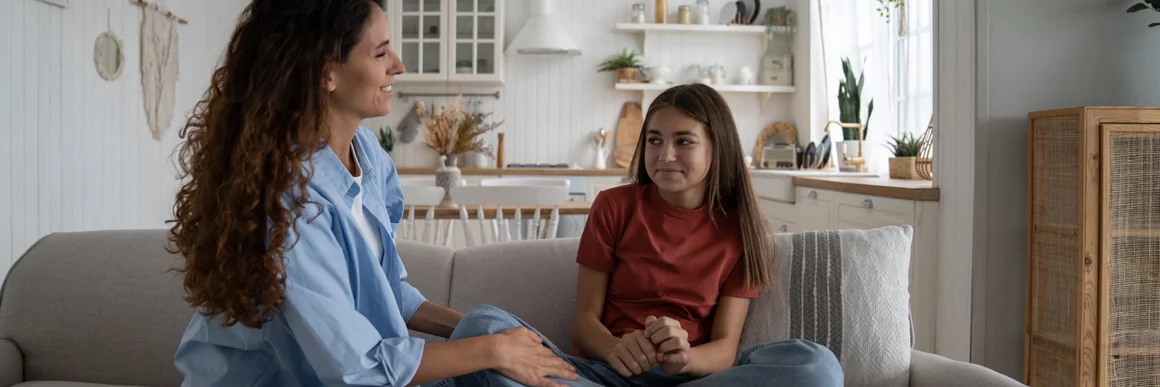Sometimes, as caregivers, we think that the discussions we have with our tweens and teens around sex must focus on pregnancy and STI prevention. Yet, the reality is that we need to prepare them to have healthy relationships in which they make decisions based on their own needs and wants, communicate effectively with a romantic and/or sexual partner, and consider the variety of aspects within these relationships.
Therefore, the conversations we have with our young people need to include the different types of attraction and intimacy, as well as ensuring personal pleasure is supported and experienced.
Talking About Attraction
People can experience a variety of attractions over their lifetime. And some people may not ever experience a specific type of attraction. All of these situations are okay. We all need to embrace who we are and follow our own paths.
To help begin your talks on attraction, consider these conversation starters:
- “What type(s) of attraction do you think you have with your closest friend(s)?”
- “You can experience attraction to all genders. This is normal as attraction does not mean you want to be intimate with all those you are attracted to. What are some characteristics that attract you to someone else?”
- “If a friend asked you which type of attraction is your favorite, what would you answer?”
- “What types of attraction might a person have to choose to have sex with a partner?”

After noting the type(s) of attraction your teen may feel towards another person, ask them what level of intimacy they are hoping to engage in. Talk about how important it is to remember that before acting on any of these attractions, you need to ensure the other person also wants to move forward in any intimate behaviors.
Talking About Intimacy With Your Teen
As many of us know, an act of sex can include one form of intimacy (physical) or many forms of intimacy. And, depending upon the person, one form may lead to another form, or only one form of intimacy will be experienced between two people.
It is for this reason that we need to talk with our young people about the importance of talking with a romantic and/or sexual partner before doing something to make sure both people are feeling the same way, are comfortable, and have similar expectations. By having these honest talks, your teen and their choices are more likely to be supported within romantic and/or sexual relationships.
To help begin your talks on intimacy, consider these conversation starters:
- “What type(s) of intimacy is most important to you in your everyday relationships?”
- “When you see romantic couples in a movie/TV show, what types of intimacy seems the most important to them?”
- “Are there certain aspects of intimacy you find important to have in a sexual relationship?”

Talking About Pleasure With Teens
To experience pleasure with another, both people in a romantic and/or sexual relationship must freely agree to what they want to do and don’t want to do with the other person and their partner needs to support these decisions. When this happens, the relationship will have a strong base for intimacy to get stronger.
To help begin your talks on pleasure, consider these conversation starters:
- “How healthy is a relationship if only one person in it is happy and feels pleasure from chosen activities?”
- “How might relationships become unbalanced when one person’s happiness and pleasure is emphasized over the other person’s happiness and pleasure?”
- “Have you thought about when you might consider becoming more physically intimate in your life?”
- “How would you describe pleasure in a healthy relationship?”
- “What types of pleasure are important for you to experience in a relationship (again, this does not have to be sexual)?”

Reminders About Attraction, Intimacy, and Pleasure
To help your teen consider where they stand in current or future romantic and/or sexual relationships, support your teen in:
- Reflecting on what type(s) of attraction they have or want to have with a potential partner.
- Talking with their potential partner to check if they are feeling the same way.
- Considering what type of attraction they are feeling.
- Considering if the type(s) of attraction is short-lived or possibly longer lasting.
Share the following questions with your teen to help them consider this longevity:
- “If the attraction is short-lived, will you feel comfortable being intimate in a certain way?”
- “If the attraction is longer-lasting, what types of intimacy do you hope for?”
Ask your teen these additional questions to help them figure out other aspects of healthy relationships:
- “Do you truly trust the other person?”
- “Are you able to honestly share your feelings and thoughts?”
- “Are your feelings and thoughts supported by the other person?”
- “Do both people agree to responsibilities within the relationship, including those relating to privacy, finances, and intimate behaviors?”
- “Are you going to do something because someone asked you to or are you doing something because it is pleasurable to you and the other person?”
- “Are you performing an act that you choose to do to express your feelings and without additional expectations?”
- “Do you speak up for yourself even though the ‘mood in the moment’ might be altered or the other person may end the relationship?”
- “Are you performing a sexual act out of your own choice and NOT to get the attention of another, feel ‘liked,’ or get a steady partner?”
- “Are you recognizing that an act of sex does not solidify a relationship?”
If all of their answers to these above questions are “YES!,” then continue talking with them on other sexuality concepts, including the physical intimacy of sexual acts.
If any or all of their answers to these above questions are “NO,” then consider going back over the affection, intimacy, and pleasure sections to support your teen in making the best decisions for themselves. Note: If your preteen or teen hasn’t experienced sexual attraction and is not interested in the physical intimacy of sex, they are not alone. Some people do not experience these things until later in life (which is okay) and others don’t experience these things at all (which is also okay). If they are in the latter of the two groups, they may be an asexual (or nonsexual) person who does not feel any desire to have sex and is not attracted to anyone, yet can still experience emotional love, respect, and pleasure within their relationships.
